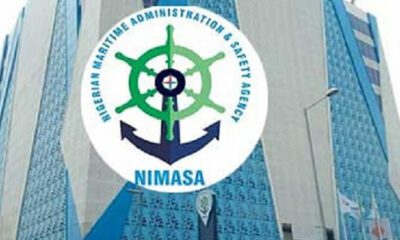Business
NIMASA expresses determination, commitment to transforming maritime sector
By Seun Ibiyemi
The Nigerian Maritime Administration and Safety Agency (NIMASA), has expressed commitment to playing a leadership role that will ensure growth and development of the maritime sector.
The Deputy Director, Shipping Development of NIMASA, Hajiya Rakiya Lamai made this known in Kaduna during the weekend, at the closing ceremony of the 44th Kaduna International Trade Fair.
NIMASA received an award for emerging the second runner up at the fair.
Lamai, who noted that the theme of this year’s fair, “Promoting Value Addition for Sustainable Growth and Development,” is apt, appreciated the efforts of the Kaduna Chamber of Commerce, Industry, Mines and Agriculture (KADCCIMA) for the award.
She noted that for emerging second runner up at the fair, it showed that NIMASA had not wasted its efforts or contributions towards the success of the fair.
“We thank KADCCIMA for giving us the opportunity to participate, and for the award which is unprecedented,” she said.
NIMASA promised to exploit all the additional values of the maritime sector, by bringing it to bare, for sustainable growth and development of the Nigerian economy.
The Director General (D-G) of the agency, Malam Bashir Jamoh, explained that Nigeria has a coastline of about 853km and about 10,000km of inland waterways, 12 nautical miles of territorial waters, 200 nautical miles of Exclusive Economic Zone.
Jamoh, who was represented by the coordinator of the Abuja Zonal Office of the agency, Mr Zailani Attah, said that the maritime sector plays a greater role in international trade and Nigeria’s import and export sectors.
“It generates appreciable revenue and creates lots of jobs. It is critical to the supply chain of the Nigerian economy,” Attah said.
While calling for more collaboration among stakeholders in realising a robust Maritime Sector interface, the DG announced that a zero tariff had been approved for brand new imported vessels.
He disclosed that one and two years old vessels would pay minimal duty of between one to two per cent, as a means of boosting indigenous shipping through fiscal incentives.
Jamoh further said that the agency would prioritise the integration of blue economy into the nation’s circular economic restoration and growth plan.
“There is no better time to have a national carrier and develop the maritime industry than now, when the world is gradually looking away from fossil fuels.
“Nigeria cannot be caught unawares; we need to look at ways of developing our shipping sector, which could earn the country even more than oil annually.
“We had in 2021 deployed the modern technology, using the instrumentality of the Deep Blue Project to implement the first ‘S’ of the tripod, which is security, to stem the tide of piracy in the country’s waterways,” he said.
He explained that the objective is to keep the waterways secure for all maritime activities to thrive, thereby positioning Nigeria’s economy on the path of rapid growth.
“Statistics released by the International Maritime Bureau, show piracy incidents in the Gulf of Guinea dropping from 81 in year 2020, to 34 in 2021, representing 58.02 per cent.”
Jamoh further said the wreck removal exercise is another milestone in the incremental achievement of the ‘Triple S’ strategy of the current management of NIMASA, anchored on maritime safety security and shipping development.
He added that in December 2021, they launched the third phase of Nigerian Seafarers Development Programme (NSDP), called NSDP Tera, sponsoring 200 cadets to different countries.
He explained that the NSDP, aims at addressing the dearth of trained and certified seafarers in the Nigerian maritime industry.
Business
May Day: ACCI tasks FG on conducive environment for workers


The Abuja Chamber of Commerce and Industry (ACCI) has urged the Federal Government to provide a conducive environment for workers to ensure efficiency and effectiveness.
The President of ACCI, Emeka Obegolu, said this in his message to commemorate the 2024 Workers’ Day.
“The chamber applauds all workers in Nigeria for their effort, hard work, and dedication toward the national economic growth and development of the country.
“To mark the occasion, I urge the federal government to continually create a friendly working environment for the Nigerian workers and provide the necessary materials and resources needed for an efficient and effective workforce.”
The theme of the 2024 celebration is “Safety and Health at Work in a Changing Climate.”
According to Obegolu, the theme is apt and has significant implications for the Nigerian business community.
He said that climate change exposed workers to various health risks, such as heat stress, and extreme weather events as well as natural disasters which could disrupt business operations and supply chains.
“Businesses need to assess these risks and implement measures to protect the health and well-being of their employees.
“There is also a need to have resilience plans in place to ensure business continuity and minimise the impact of climate-related disruptions,” he said.
The ACCI president called on government at all levels to introduce new regulations and policies related to workplace safety and health in the context of climate change.
Obegolu said businesses needed to stay informed about these changes and ensure compliance to avoid legal and financial consequences.
He said, “Commitment to workers’ safety and health in the face of climate change can enhance a business reputation and build trust with employees, customers and other stakeholders.
“We (ACCI) will continue to advocate safety and health at the workplace in a changing climate.
“This is because we are a chamber of commerce that seeks not only the interest of the business community but also that of workers.
“I wish all Nigerian workers a happy Workers’ Day on behalf of the executive council and members of the chamber,” he said.
Business
Dangote Refinery will get valid operating licence soon – FG


The Federal Government announced that it is set to issue a fully valid operating licence to the 650,000 barrels per day capacity Dangote Petroleum Refinery.
It announced this at the Stakeholders’ Consultation Forum on Midstream and Petroleum Host Community Development Trust Regulations organised by the Nigerian Midstream and Downstream Petroleum Regulatory Authority in Abuja.
The NMDPRA, an agency of the Federal Government, however, explained that though it had awarded a pre-commissioning licence to the $20bn refinery, a fully valid operating licence would be issued to the Dangote refinery soon.
Dangote refinery was inaugurated by former President Muhammadu Buhari in May 2023. The facility started releasing Automotive Gas Oil, popularly called diesel to the domestic market in April this year. It has yet to release Premium Motor Spirit, popularly called petrol.
Speaking at the forum in Abuja on Tuesday, the Chief Executive, NMDPRA, Farouk Ahmed, told industry players and other stakeholders that the authority would issue a fully valid operating licence to the refinery very soon.
Ahmed, who was represented by the Executive Director, Distribution Systems, Storage and Retailing Infrastructure, NMDPRA, Ogbugo Ukoha, pointed out that currently, only three refineries have valid licences.
“We have issued three refineries with three valid licences. We awarded to Dangote refinery even in their pre-commissioning and sooner than later they will have full commission and a valid licence to also operate,” he stated.
He also stated that about 15 gas facilities across the country have valid licences while more are undergoing processing.
The NMDPRA boss said there are 1,199 facilities with valid licences in the downstream, while more than 176 operators hold gas import permits.
Ahmed said 130 depots have valid licences while 69 hold valid coastal vessel licences, adding that NMDPRA has licensed 9,464 retail outlets as of 10 am on April 30, 2024.
“In the gas processing facility within the midstream, there are about 15 of them with valid licences. And much is under processing. If you go to the downstream sector, in the gas state of the downstream, more than 1,199 facilities have NMDPRA valid licences.
“More than 176 operators hold gas import permits. In the liquid licensing side of the downstream, there are 130 depots with valid licences and coastal vessels of more than 69 valid licences as of today. And in the retail outlets, we have 9,464 licensed retail outlets as of 10 am today, April 30,” Ahmed stated.
He explained why locations in the midstream and downstream arms of the oil sector were included as part of host communities, stating that emissions and effluence affect them.
Ahmed said the authority organised the forum for stakeholders to ventilate their ideas and proffer measures that would further enable the NMDPRA to relate better with host communities in the mid and downstream arms of the oil sector.
Business
Cost of healthy diet stood at N982 in March – NBS


The National Average Cost of a Healthy Diet (CoHD) per adult a day stood at N982 in March 2024, the National Bureau of Statistics (NBS) has said.
The NBS said this in its CoHD report for March 2024 released on Tuesday in Abuja.
The bureau said the CoHD in March increased by 4.7 percent compared to the N938 recorded in February.
The NBS said the CoHD was the least expensive combination of locally available items that met globally consistent food-based dietary guidelines.
It said it was used as a measure of physical and economic access to healthy diets.
“This is a lower bound (or floor) of the cost per adult per day excluding the cost of transportation and meal preparation.”
The bureau said that to compute the CoHD indicator, the following data on Retail Food Prices, Food Composition Data, and Healthy Diet Standard were required.
The NBS also said that in March, the average CoHD was highest in the South-West at N1,198 per adult per day, followed by the South-East at N1,140 per day.
It said the lowest average CoHD was recorded in the North-West at N787 per adult per day.
The NBS further said that at the state level, Ekiti, Lagos, and Abia recorded the highest CoHD at N1330, N1249, and N1215.
The bureau said Katsina recorded the lowest CoHD at N739, followed by Sokoto and Zamfara at N758 and N766.
The NBS said CoHD had steadily increased since the first CoHD report by the bureau in October 2023.
“The CoHD in March 2024 is 40 per cent higher than what was recorded in October 2023 at N703 and five per cent higher than CoHD in February 2024, which was N938.
“The food groups that have driven the increases in CoHD the most are vegetables, starchy staples, and fruits. The cost of meeting the recommendations for oil and fats have changed the least.”
According to the report, animal-source foods are the most expensive food group recommendation to meet in March, accounting for 37 percent of the total CoHD to provide 13 per cent of the total calories.It noted that fruits and vegetables were the most expensive food groups in terms of price per calorie.
“They accounted for 12 percent and 14 percent, respectively of the total CoHD while providing only seven per cent and five per cent of total calories in the Healthy Diet Basket.
“Legumes, nuts and seeds were the least-expensive food group on average at six per cent of the total cost.”
The report also said that in recent months, the CoHD had risen faster than general inflation and food inflation.
“However, the CoHD and the food Consumer Price Index (CPI) are not directly comparable.
“The CoHD includes fewer items and is measured in Naira per day, while the food CPI is a weighted index.
“The food CPI increased approximately by four per cent between January and February, while CoHD increased by nine per cent.”
The NBS said the policy implications of these results would foster collaboration among a wide range of stakeholders, such as policymakers, researchers and civil society actors that focus on food security.
“These stakeholders will devise strategies that tackle access, availability, and affordability of healthy diet effectively.
“Also, future research incorporating income can also be used to determine the proportion and number of the population that are unable to afford a healthy diet,” the report said.
-
capital market2 years ago
Rt.briscoe, FBNH, Others halts negative performance of stock market
-
Finance3 months ago
Court orders Sen. Victor Umeh to repay N136m bank debt to AMCON
-



 Abuja Update2 months ago
Abuja Update2 months agoUNDP, FG partnership needed to achieve inclusion, equity- Minister
-
Abuja Update1 month ago
Banks drive stock market performance with N147bn gain
-



 Business1 week ago
Business1 week agoTingo Group unveils Tingo Electric, Tingo Cola drink at Lagos launch
-



 Health2 weeks ago
Health2 weeks agoCapacity training will reduce migration of health workers- NPHCDA
-
News4 months ago
Oil thieves sponsoring malicious media campaign against Navy – Spokesman
-



 Infotech1 month ago
Infotech1 month agoWorld Backup Day: NITDA urges Nigerians to ensure backup of data
















